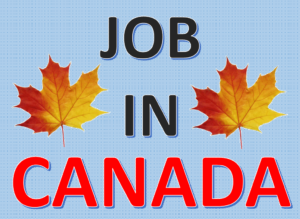
In recent times Canada’s Job market has been a
hot topic for new immigrants as well for local Canadians. Employment industry
of Canada is quite different from most of the Asian and East European
countries. Majority of New immigrants in Canada are from India, China,
Pakistan, Nepal, Sri Lanka, Bangladesh, Indonesia and other Asian countries. To
find your desired job profile is a tough nut to crack, considering the first
and the foremost struggle for every newcomer is to find a white-collar job in
first place. Canada’s recruitment structure is completely different, besides
the work culture which is far more different. Let’s look at the broad process
to be followed to get into your desired job in Canada.
no guarantee of 2 ‘W’s, ‘Work’ and ‘Weather’. When I first arrived in Toronto,
my friends advised me the one thing to do each morning after I wake up is to
check the temperature and weather conditions, and hence be prepared for the
day. Similarly in Canadian job market you are always standing on the edge and
you never know when your employer surprises rather shocks you with bad news!
Even in such state of affairs, if one is determined to work, he/she will never
be jobless, so don’t worry and keep doing some value addition in terms of
certifications, take memberships of associations of your field, do volunteer
work whenever you can, harbor better relations with peers and boss, develop
your LinkedIn profile, the central idea of these activities is to invest
your time in ‘Networking’.
Identify Industry:
of work that they know how to do but it doesn’t mean you cannot change your
industry. You can, but for that you should pursue some education,
certifications, licensing etc. to support your transferability of skills as
well to be able to fight competition.
future in next 5 years in it. Consider below points to decide onto the industry
you want to be in:
- Stability
- Future prospects
- Pay Scale at each level
- Industry hub location (e.g. Toronto is hub for Finance while for oil & gas Alberta can be good place)
- Competition
- Major companies in that industry in Canada
Identify
Roles/designations:
initial stage of your Canadian career about the industry you want to work in,
the one that you feel you have better knowledge and an edge over others. What
recruiters here care the most about is “what you as a candidate bring to the
table”, no one here really will train you on the job and to be able to do that,
the hiring managers make sure that best candidate is the one who knows his work
already and has the necessary skill set, the one who is productive from day
one. It’s very important to be a specialist of one particular area, where
gradually you can become an expert.
operations, production, human resources etc. but you have to be focused on your
core competency. Patience and perseverance are the key here. Don’t be
distracted by easy way out. You will get ample job options here which will lead
you to nowhere.
Find out if your industry
is regulated or not?
If yes find out what
certifications/licenses/Accreditations required to apply for position you are
looking for.
government regulations, guidelines to work and necessary federal/provincial
licensing requirements. For example, you should have IFIC/CSC to get into front
line banking roles such as Financial service Representative/Customer
service representative. There are similar licensing requirements for almost all
regulated jobs like insurance advisor, security person, police service,
paramedics, medical and health industry. So do your home-work wisely, meanwhile
I will bring upon industry wise trends and information in my later blogs.
Find out companies which
may sponsor you to do necessary licensing:
considering your past experience while others don’t, Although it is always
better to be job ready and have licensing in advance.
next day in case of urgent openings. Plan in advance, arrange child care if you
have children and your partner is also working, location, commute timings and
public transport availability nearby your place of stay, and any other
obstacles which may come between you and start working.
Prepare your Resume &
Cover letter well (Resume preferably One Page):
application. I came across many friends, who have applied for more than 500
vacancies and never got a single reply on email or call! Reason being, used one
standard resume to apply for every job. Start preparing unique resume for each
job you apply to because recruiters here look for specific words/skills in your
resume that if matches with the job requirement, you might stand a chance to go
to the next stage of recruitment.
how many jobs you applied. You have to devote at least 20-30 minutes for each
job application, read job requirement first, and if you think you qualify the
go ahead read the job description carefully and do necessary changes
accordingly on your resume and cover letter.
there are hundreds of applications and hiring managers cannot be expected to go
through lengthy 2-3 page resumes.
Refer: https://www.jackopedia.net/2019/04/how-to-mold-your-resume-for-canadian.html
Prepare for your interview,
questions which interviewer can ask you:
employers here want two important skills in their employees which are, ‘Team
Player’ and ‘Problem Solver’.
and cite examples of how you handled a particular situation at work. STAR
format can be used for your answers given as under:
Task: Your responsibilities and assignments for the situation
Action: Steps or procedure taken to relieve or rectify situation
Result: Results of actions taken.
is where you will emphasize on what you did in that situation that highlights
your qualities/skills.
don’t want to lose the battle after coming this long and after putting so many
efforts. Checklist at this point:
- Always ask few relevant questions to interviewer at end of the interview.
- Also be thankful and ask for next process in selection.
- Ask interviewer if it’s ok to follow up with him/her over email or phone and when to do that.
- Do prior research on pay expectations and always give your range with $5k difference (e.g. $55K-60K).
- Send a thank you email after interview and mention one or two good things during interview.
information for each topic.




hello, is there a way i can contact you ?
Email me on shyam2084@gmail.com
This is really informative. I just shared you my connection request in Linkedin.
Thanks a lot!